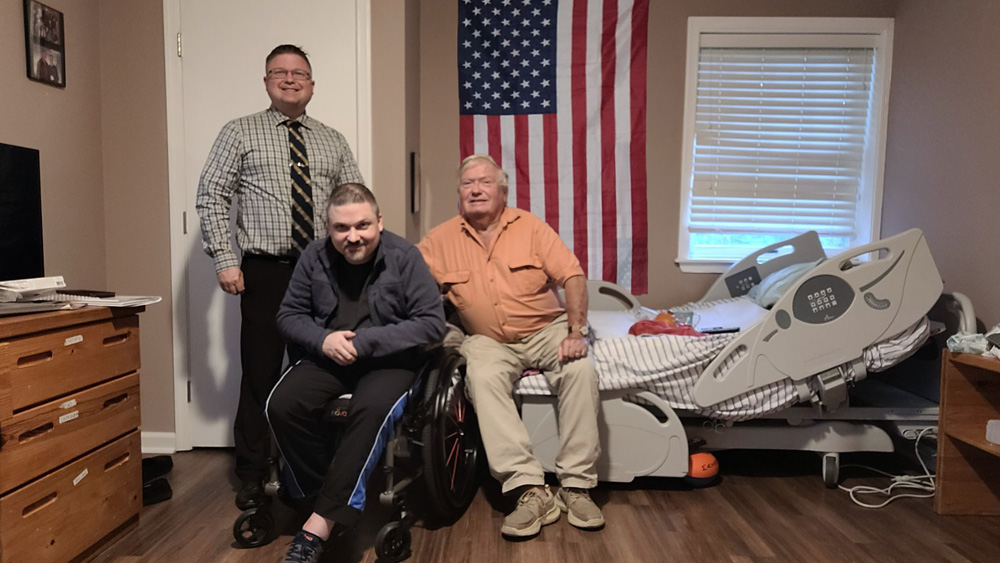Early Life and Aspirations
Ken Sebby was born in North Dakota and raised in Beatrice, Nebraska, his childhood was marked by cold, snowy winters that inspired him to learn how to ski, and summers filled with golfing and playing the guitar. As a serious student, excelling particularly in the sciences, with a dream of attending medical school. His family played a significant role in shaping my work ethic and aspirations. Ernest Sebby, his father, a WW2 era Veteran, was an electrical contractor responsible for wiring numerous large buildings in the local area. Whilst his mother, Fern Sebby, was a dedicated homemaker who raised cocker spaniels and sang in the church choir. As the eldest of four children, he grew up alongside three siblings Karen, Kathy, and Les. While none of his sisters of brothers joined the military, his father served during WW2 and greatly influenced his views on service and duty.
His academic journey took him through primary and secondary school in Beatrice, followed by the University of Nebraska for college. He then attended the University of Nebraska Medical Center in Omaha for medical school, completed an internship at the University of Southern California, and a residency at Tulane University. These experiences were foundational, setting the stage for his unexpected draft into the military during the Vietnam war.
Entering Service
In 1977, after completing a rigorous residency in Orthopedic Surgery, Ken was drafted into the U.S. Air Force for two years. This was part of the final group drafted for service, an event that his family had accepted as part of my journey. Ken Sebby’s entry into the military was not marked by basic training. Instead, he underwent an orientation designed for medical professionals who were already in their thirties. Stationed at March Air Force Base in Southern California, ken’s role was to practice as an orthopedist, directly applying the skills he had developed over years of study and training.
Life During U.S. Military Service
Ken’s two-year tenure at March Air Force Base coincided with a peaceful period following the end of the Vietnam War. The military base was located in Riverside County, about 60 miles east of Los Angeles, a region known for its ideal weather. He formed friendships and camaraderie there, especially with other medical professionals. Developing a lifelong bond with another orthopedist drafted into service and his wife, who was an obstetrician. It was a relaxed and rewarding environment, engaging in recreational activities like volleyball and golf.
He sustained communication with family and friends through phone calls and mail, keeping ties strong despite physical distance. Ken’s shared experiences fostered a supportive community that has left enduring impressions long after his U.S. military service ended.
Transition to Civilian Life
Concluding Ken’s military service involved an end-of-service party with the camaraderie he had built over the two years. Afterwards, Ken relocated to the Coachella Valley, joining two hospitals in the area. The transition to civilian life was smooth, bolstered by connections made during service. Ken quickly resumed my career in orthopedics. The affiliations formed during this time were lasting; continued professional relationships and friendships have remained a significant part of my life.
Reflecting on his service, it’s clear how his experiences deepened his appreciation for Veterans and further informed his respect for those who serve. Engaging with the Department of Veteran Services on several occasions throughout his career allowed him to maintain a connection to this important facet of his identity. He continues to recognize the importance of U.S. military service through observance of days like Memorial Day. Using these moments for remembrance and reflection.
Reflections and Lessons
The lessons Ken learned during his time in the U.S. military has been influential. Understanding the importance of character when facing challenges and developing a greater perspective on the strengths and flaws of our nation are invaluable outcomes of service. Service in the military imparts a unique understanding of duty and sacrifice that enriches personal and professional interactions.
Ken is proud of his accomplishments, namely earning a degree, serving honorably, and raising his two sons who have also served in the U.S. military. These elements of his life are sources of immense pride and represent a legacy that values service and commitment. Emphasizing the significance of honoring those who serve, he maintain a heartfelt advocacy for providing Veterans with the respect and care they deserve.
For future generations, the message he wishes to convey is that military service, regardless of whether in times of war or peace, is vital. We must give it national honor and attention, ensuring we support all who have served in meeting their needs after service. His involvement with institutions like the Department of Veteran Services reflects a commitment to enhancing the lives of Veterans and their families.
Conclusion
Throughout Ken’s life, he has carried the experiences and lessons from his military service as integral components of his identity. It has been a privilege to serve alongside dedicated individuals and to continue contributing to the welfare of Veterans through both professional and personal efforts. Ken Sebby’s story is one of dedication, service, and a commitment to fostering understanding of the sacrifices and unwavering dedication that characterize all who are in the U.S. military service. Emphasizing fiscal responsibility, he believe in judicious management of resources—a philosophy that supports long-term security and peace of mind.
More than anything, Ken urges the recognition of Veterans as diligent and committed individuals who have given generously to their country. Their dedication is profound, and our collective societal responsibility is to honor and support them throughout their lives.











